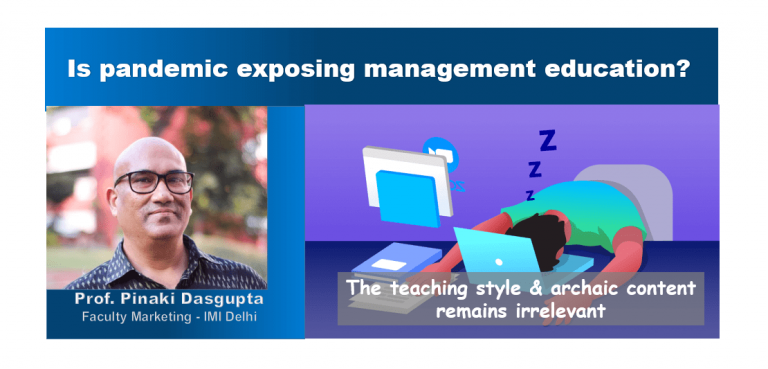Let us face it! Most business schools are struggling to find a way to beat the battle with the fatigue generated through teaching online. For the last one year, most schools have experimented with pure online or a hybrid model. But there are no success stories that have emerged. The only one we heard was of IIT Goa and their experiment of a reverse supply chain model of asking candidates to frame questions in the exam hall instead of writing answers to questions. But it is an open truth that most campuses and faculties are struggling to stay relevant and make their content relevant. You can ask a faculty member about innovations in the pedagogy, and he/she will rattle a list of things done. Believe me, most of that is essentially trying to please oneself (including yours truly).
By default, a couple of students in the current batch of the students I am teaching at my alma mater; their parents are my old associates. Hence, I might be one of the luckier ones to know what is happening on the other side of the screen. Parents’ normal remarks: “my son is on video games most of the time, is there a teacher “teaching”?”. “I see him only sleeping all the time and when he is awake, classes are long over”. “Are you guys planning to experiment with the teaching?”
Many more remarks like these keep flowing in. And it gives a sense of the anxiety that parents go through. And the money is not cheap. Tuition fees go into lakhs or maybe thousands. The anxiety of internship and placements are added baggage to worry about.
Where do we go from here?
The pandemic will not recede anytime soon. Even if cases go down and the things are limping back, the fear-psychosis will work. Parents shall remain wary of sending wards to institutions and even institutions will refrain from simply opening the floodgates. Large campuses will have some leverage here, but then it is only to the limit of the campus. It remains the Roman Colosseum, where the size doesn’t matter where the opponent is baying for your blood amongst Gladiators.
I would sense some ground level decisions have to be taken. First, business schools are placement agencies, and they cease to be a school that talks of business and business sense. It might be plain Jane to think that business school should help me hone my business skill or perhaps to manage a business or perhaps to assist an existing business and if none of the above; be at the background of where business takes place (read Analyst profile here).
9 out of 10 graduates end up as analysts and they are happy in that.
On an investment of 10-15L it is a ROI of about 7.5-10L which is pretty much manageable. Majority of the students take loans and that works to about 40% of the EMI. Curriculum, teaching, pedagogy, and everything else is inane or probably mundane. Schools’ thing that because of them the placements are good, and students think that schools have nothing to do with placements. But, in all most (99.9%) business schools run placement agencies. Pandemic remains irrelevant, therefore. If my placement and internship remain good, I do not need to worry.
The teaching therefore remains irrelevant. The archaic curriculum must change.
Accounting, HR, OB, Marketing, Biz Comm, and a host of subjects being taught are like NFT. They will need to upgrade. The archaic curriculum must change. Most faculties are comfortable teaching what they have been teaching for 100 years. It is convenient, easy and most of all, helps me stay in the comfort zone. Faculty members have been teaching their course for ages and refuse to shy away and experiment. That will not work. Chalk and talk, PPT, Case based teaching, archaic content will remain irrelevant. Take for instance a course like Accounting which is quite relevant to Business. Modern business is about smart P&L management. As business starts focusing on growth (a shift from the days of profit), P&L will be the key. How many schools talk of P&L management? Sampler: Teaching Accounting and managing P&L are two separate things. Say, I am running a cloud kitchen and the order size is increasing. There are fixed and variable cost implications. In the greed to cater to the higher order size, I hire two additional staff. What are the implications on FC and VC and eventually on P&L, not many faculties get into that!
Application of everything is the key. Analytics is the new buzz word in the B school space. But I cannot keep chanting Analytics like a Soka Gokai congregation. It has more to it beyond the obvious. Sampler: while teaching Marketing Analytics (and this is my own experience) I am not required to teach R Codes and R programming. I am supposed to showcase Analytics in real time. We are talking of the Kirana Store revival with the pandemic. How does data validate that? Is that a myth? Or will the same surge remain post pandemic? Some of the questions are predictive and some are descriptive? Can the analytics course get into that? Or there are millions of stakeholders coming to vaccination centres for their doses. There is a waiting time of 10-15 minutes and may go up to a few hours (depends on the place and time). Healthcare data can be captured and a basis for Universal Health Cards be created. Such data creates a repository of one patient, one record; something we have been discussing for ages. A ground-breaking work for Analytics, I guess.
And some B schools which talk about research are merely publishing.
Research leads to publication and not the other way round.
In my years at business school, I seem to have seen and witnessed most stuff being taught are post facto or retrospective. It has happened and then we join the dots. Why cannot we be predictive and think ahead? One thing any business school predicted, and it fell in place? One trend that business school captured and is here to stay? One insight that business school developed, and marketers lapped it? One prediction that worked for business amending from business school. None! This is because of the teaching culture (most of them remain teaching shops), the archaic curriculum and most of all the resistance to change. And some schools who talk about research are merely publishing. It is important to note that PUBLICATION AND RESEARCH ARE TWO SEPARATE THINGS. RESEARCH LEADS TO PUBLICATION AND NOT THE OTHER WAY ROUND. Check out some of the fresh FPM and they give an idea of the faculty base developing for the future. It is a mad rush to ABDC, Scopus, Web of Science and so on and so forth. Talk of how the research aspect is built in the paper published and the scholar will throw some existing papers at you, citing RESEARCH GAP that the paper aims to plug. Sad!
The victim in all remains the students. Remember there are no bad students but bad teachers. The pandemic has exposed that even more.
Suddenly, the curriculum, incompetence and the resistance to change is exposed. In an offline mode the element of error is handled which cannot be handled in the online space. I remember in the offline mode I took classes at 8:30am and most students were found half dazed or dozed. I could handle them through the pedagogy innovations in the course. However, in online mode, it is difficult but not impossible. I need to go the extra mile to keep everybody awake and make content relevant. How many of us are willing to do that?
It is a question for which answers are not easy. It is a tough choice that one must make. But the choice must be made. In the next five years the concept of business school will undergo radical shift (it might not even exist). Only the ones that innovate will survive. Remember, just like the corporate world has woken to a new normal of work from home, flexi timing, virtual offices, virtual meeting (Zoom, Meet, Teams) and numerous other changes, the business schools will need to explore changes too. For one, change the archaic curriculum, teach less, get faculty who ONLY have corporate experience (minimum 5-7 years), remove that irrelevant cap of FPM as a desirable qualification and publications as the norm (both these are inconsequential and irrelevant), and finally, explore new content.
The early bird gets the worm!
About Prof. Pinaki Dasgupta – Professor Pinaki teaches Marketing area at IMI, New Delhi. Prior to teaching he was with some of the top advertising agencies – Rediffusion DY&R and Mudra where he managed clients like Airtel, Canon Cameras, UP Tourism, Taj Group of Hotels, Andrew Yule etc. Prof. Pinaki’s area of interest has been Consumer Behaviour, Brand, International Marketing, Communication and Digital Marketing. Before joining IMI, he was with IIFT.





